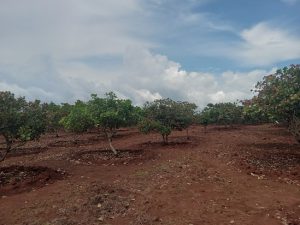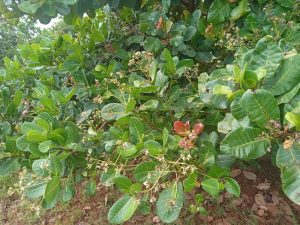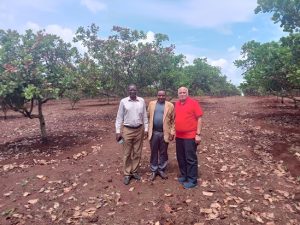Sushil Toshniwal (Right) inside his cashew nut plantation. On his left is Joseph Patrick Okilan, the technical officer at the farm
Cashew nut (Anacardium occindentale) is one of the highly thought after high value crops globally.
In Uganda, the hardy drought resistant tree crop was introduced in 1970s, but has gained more recognition in the last five years.
This explains why the crop appears to be new in Uganda, with many farmers ignorant about it and its associated benefits.
Cashew nut offers enormous benefits including; nutritional benefits where it provides macro and micro nutrients, such as protein, magnesium, zinc, copper, manganese a potential Source of vitamin C.
Industrially, cashew nut is used in the manufacture of varnishes, typewriter rolls, industrial flooring tiles, gum, inks, oil cloth, paints, water-proofing paper, acid and alkali resistant cements and laminating resins.
Cashew nuts are also used as recipes to make sweets, chocolate and milk/butter.
The cashew apple is a light reddish to yellow fruit, whose pulp and juice can be processed into a sweet, astringent fruit drink or fermented and distilled into liquor. From selling raw and unprocessed cashew nuts alone, a farmer can earn an average of Shs11m from an acre of cashews.
In Uganda, it’s largely foreign investors that are planting the multi-purpose nut in large quantities.
In United States of America, the National Cashew Day is celebrated every November 23 to highlight the importance of the crop.
As the popular nut for partying and snacking gains momentum globally, Business Focus on November 23, 2022 visited one of the biggest cashew nut farms in the country with the aim of understanding why investors are increasingly going for this crop which is seemingly ‘new’ to many Ugandans.
In Wamayonjo LC1, Wabiyonyi Sub-County in Nakasongola district, sits a 400-acre farm of cashew nuts. The farm is subdivided into various blocks and the cashews are at different stages, with hundreds of acres already productive.
The farm is owned by Universal Agro Processors Ltd, whose Chief Executive Officer is Sushil Toshniwal, an Indian national. He has also planted 400 acres of mangoes.
The investor chose Nakasongola because cashews perform well in dry areas with annual average temperatures above 28°C and having well drained deep sandy loam soils with high textural porosity.
This makes it a very suitable commodity for dry cattle corridor areas of Uganda.
In an exclusive interview with Business Focus, Sushil said that he left India about nine years ago to invest in Uganda after learning that the country had a good investment climate.
In total, the company has so far planted 18,000 cashew trees.
“We decided to invest in mangoes to tap into the future mango pulp industry and the advantage here is that we have two seasons due to the Equator factor. That’s the main reason for investing in mangoes. When we set up a processing factory here in future, we shall be buying mangoes from the surrounding areas to complete our requirement,” he says.

As for cashew nuts, he says the crop is the best to be grown in Africa and Uganda in particular.
“No body has grown cashews properly in Uganda. After our investment, more people are investing in large scale cashew farming. Indian people like African cashew nuts. 90% of the cashew nut which is purchased by Indian companies for process is from Africa,” he says, adding that the company has started harvesting its cashew nuts.
He adds that they are still exporting raw cashew nuts because the quantity is still small to be added value to.
Despite the challenging requirements by Government, Sushil says two months ago, the company exported to India its first container of raw cashew nuts (worth about 14 tonnes).
He says they plan to plant more acres of cashews as they take care of the already planted cashew nuts. He says with good care, cashew nuts can live up to 50 years.
Ugandans should embrace cashew nut farming
Sushil is calling upon Ugandans to venture into cashew nut farming, saying the crop has assured market.
“It is a good crop. I encourage our people in Nakasongola and the surrounding areas to plant cashew nuts. If you give it good care, it gives good returns,” he says, adding that they plan to have a processing unit in the near future once they have sufficient quantities of the raw material.
The company employs about 60 people.
Asked about how he has found Uganda for the last nine years, Sushil said: “Uganda is a very good place. I want to have my retirement life here. The nature is good.”

The 65-year old says he has other businesses in India and the US that are being taken care of by his two sons.
On how much the company has invested in the country so far, Sushil says: “We have invested sufficient amount of money and we are still investing.”
He adds that he also invested in the country for his own pleasure since he likes a green evironment.
To manage weeds in the cashews, he has embarked on planting lemon grass. He will extract oil from lemon grass and make extra money.
Challenges
Sushil says sometimes labour is a challenge as some workers go away after payment only to return after a long time. He however applauds the workers he started with nine years ago and are still with him.
He adds that getting the right agro-chemicals for cashews in Uganda is challenging too. This is why the company asked Government for a license to import agro-inputs and chemicals for their own use. He says cashews are mainly affected by pests and fungal diseases.
He says that in the beginning they lacked a technical person to help them set up the cashew nut farm. In the process, out of the 7,000 seedlings they had planted, only about 700 survived. This was frustrating to the investor.
The company had also planted about 100 acres of oranges but they didn’t do well. The company is now cutting and replacing them with cashew nuts.
He adds that some of the challenges are being addressed by local Government and leaders.
He calls on Government to waive income tax to investors in agricultural sector for at least 10-15 years.
“This will make Uganda beautiful in agriculture. It will attract more investors,” he says, adding that more incentives on exports are also needed.
Expert Speaks out
Joseph Patrick Okilan, a technical person/expert on cashew nuts says the crop likes sunshine for better fruiting as opposed to rain.
“It’s also a less labour intensive crop although much attention is needed to manage diseases. Early response to diseases is key,” Okilan, who describes himself as Uganda’s pioneer of commercial cashew nut farming, says.
He adds that the crop has guaranteed market.
“When we carried out a mini-survey in 2012, we realized that Kampala’s demand for cashew nuts was 60 tonnes per year of processed cashew nuts. At the time, we were producing less than a tonne of processed cashew nuts. As of now, Uganda can now produce 50-60 tonnes of raw/unprocessed cashew nuts per year. That’s about 20 tonnes of processed cashew nuts which is one container if we were to export it,” he says, adding that the demand for cashew nuts is increasing in Uganda and the world at large, but production is still very low.

“Ugandan market is dominated by cashew nuts from Tanzanian,” Okilan says, adding that a farmer can earn as high as Shs22m from two acres of cashew nuts per year by selling unprocessed cashew nuts.
He however says a farmer can double the earnings if cashew nuts are processed.
He says an acre can accommodate 60 trees using a spacing of 10 meters by 10 meters. He adds that a tree of 10 years can yield an average of 55kgs of unprocessed cashew nuts per year.
Okilan adds that hybrid varieties can yield as high as 100kgs per year. After flowering, it takes only three months to harvest cashew nuts.
He reveals that a kilogram of unprocessed cashew nuts costs an average of Shs5000 at farm gate price at the moment. This means that with hybrid varieties, a farmer can earn as high as Shs20m from an acre of cashew nuts.
Tukam Dixon Kyaba, the Executive Director at Cashew Farmers & Promoters National Association of Uganda Ltd, says Government should listen to challenges being faced by investors in cashew nut farming like Sushil.
He adds that cashew nut nursery operators have gone three seasons without supplying seedlings. He calls on Government to walk the talk by investing in the crop since it is one of the high value priority crops.

He says all districts that fall in the cattle corridor should be urged to plant cashews.
“Each homestead in the cattle corridor should plant about 50 trees. If this is done, we shall have millions of trees which is good for the environment. It will also bring more Ugandans into the money economy,” he says, adding that being a hardy drought resistant tree crop, cashew provides potential benefits to climate change mitigation especially for the dry land areas.
Global View
In 2020, global production of cashew nuts (as the kernel) was 4,180,990 tonnes, led by Ivory Coast and India with a combined 39% of the world total.
Vietnam, Burundi, and the Philippines also had significant production. Vietnam was the largest processor of cashew globally in 2020.
The top ten exporters of cashew nuts (in-shell) in value (USD) in 2021 were Ghana, Tanzania, Guinea-Bissau, Nigeria, Ivory Coast, Burkina Faso, Senegal, Indonesia, United Arab Emirates (UAE), and Guinea.
For tips or get featured, opinions and advertising, Tel: 0775170346/0703828741/staddewo@gmail.com. Follow us on Twitter: @TaddewoS @BusinessFocusug







Am interested in joining that venture of chewnut farming at my farm in Mubende District. More agronomic advise is key for my long-term investment.
How would the local farmers get involved
I am in Lira and have planted 60 plants. Planning to add more plants. The crop was planted at Ongom Citrus Farm in Alebtong district because of good environment for growing cashew nut. I will campaign for expansion of cashew nut in Lango sub region.
Mr obong I am a young farmer in otuke district I would like to convene with you
I planted 60 plants and started fruiting. Hope to plant more trees.
I would like to join the curshew Nuts growers Association of Uganda. I have planted ove 600 trees which have now made a year. some have started fruiting.
Connect me to the association
I am impressed with the level of cashew development out there with you.
This is similar to what we have started in Liberia 🇱🇷. Thank you for the great work.
God bless
Thanks so much for the business focus indeed you have focused us woooooooooooooow so impressive how many acres?? oOoOO my God